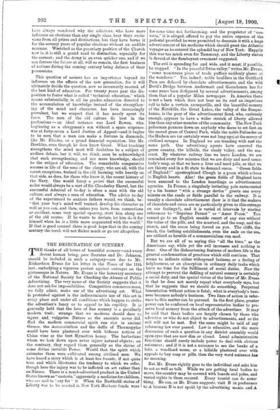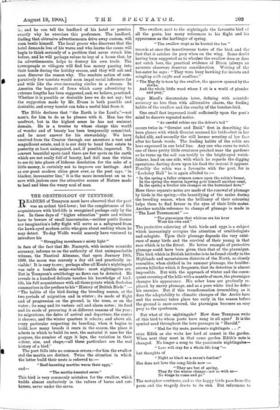THE DESECRATION OF SCENERY.
THE thanks of all lovers of beautiful scenery—and every decent human being, pace Socrates and Dr. Johnson, should be included in such a category—are due to Mr. Richardson Evans for his letter in the Times of the 11th inst., embodying a vigorous protest against outrages on the picturesque in Nature. Mr. Evans is the honorary secretary of the National Society for Checking the Abuses of Public Advertising. The very name of the Society suggests that it does not ask for impossibilities. Competitive commerce must, we fully admit, make use of the advertising art. What is protested against is the indiscriminate use of this art in every place and under all conditions which happen to strike the advertiser's fancy or to appeal to his cupidity. It is generally held that the love of fine scenery is a peculiarly modern trait; strange that we moderns should dare to kjere.. Land__ vulgarise Nature as the ancients never did. Had the modern commercial spirit run riot in ancient 4reece, the Acrocorinthus and the defile of Thermopylae would have been plastered over with hideous notices of Chian wine or the best Hymettus honey. The barbarians whom we look down upon never injure natural objects ; on the contrary, they regard them generally as the shrine of some divine invisible Power. Would that the spirit which animates them were cultivated among civilised men. We have heard a story which is at least ben trovato, if not quite true, and which illustrates the tendency to which we refer, though here the injury was to be inflicted on art rather than on Nature. There is a much-advertised product in the United States known as " castoria," apparently a medicine for children, who are said to "cry for" it. When the Bartholdi statue of Liberty was to be erected in New York Harbour funds were
for some time not forthcoming, and the proprietor of "cas- toria," it is alleged, offered to pay the entire expense of the pedestal provided he were permitted to decorate it with a huge advertisement of his medicine which should greet the Atlantic voyager as he entered the splendid bay of New York. Happily this was too much even for Tammany, and the Liberty statue is devoid of the flamboyant ornament suggested.
The evil is spreading far and wide, and it must, if possible, be stopped. " In the peaceful Swiss valley," writes Mr. Pvans, " some monstrous piece of trade puffery suddenly glares at the wanderer." Yes, indeed; noble boulders in the Gotthard Pass are defaced by chocolate advertisements, and the wild Devil's Bridge between Andermatt and Goeschenen has for some years been disfigured by several advertisements, among them that of a popular Milan newspaper. In America there is not a barn which does not bear on its roof an imperious call to take a certain earsaparilla, and the beautiful scenery of the Katskille, the Great Lakes, the valley of the. Susque- hanna, is the prey of the advertisement fiend, who, curiously enough, appears to have a wider stretch of liberty allowed him than any other member of the community. The New York policeman pounces down on anybody who dares to set foot on the sacred grass of Central Park, while the noble Palisades on the Hudson are (or certainly were not long ago) at the mercy of civilised savages. In England we are treading with zest the same path. Our advertising agents have annexed the green country, the hillside, the shady valley, and the sea- coast. By whatever railway line we leave London, we are reminded every few minutes that we are dirty and need some, body's soap, or that we have a liver and need pills, or that we are thirsty and in a fit state to demand cocoa. " Green fields of England !" apostrophised Clough in a poem which echoes in English hearts. Alas ! the green fields of England have been annexed to the London hoardings as advertisement agencies. In France, a singularly irritating pole surmounted by a tin banner " with a strange device " greets one every minute on the roads or fields parallel to the railway. It is usually a chocolate advertisement (how is it that the makers of chocolate and cocoa are so particularly given to this outrage on our feelings P), and it is varied at intervals by staring references to " Supreme Pernot" or " Amer Picon." You cannot go to an English seaside resort of any size without the value of the pills, and the mustard, and the soap, and the starch, and the cocoa being forced on you. The cliffs, the beach, the bathing establishments, even the sails on the sea, are utilised as heralds of a commercialism run mad.
But we are all of us saying this "all the time," as the Americans say, while yet the evil increases and nothing is done. One of the disheartening features of modern life is the general condemnation of practices which still continue. That seems to indicate either widespread laziness, or a feeling of helplessness, or an absorption in ordinary daily tasks which leave no time for the fulfilment of social duties. Now the attempt to prevent the defiling of natural scenery is certainly a social duty, and the special virtue of the letter of Mr. Evans is that he does not merely repeat what everybody says, but that he suggests that we should do something. Perpetual lamentation without action is fatal; what is everybody's busi- ness becomes nobody's business. Two lines of action in refer- ence to this matter can be pursued. In the first place, greater power can be conferred on local representative bodies to pre- serve local scenery from the attack of the advertiser. It may be said that these bodies are largely chosen by those who advertise or who do not object to advertisements, and so the evil will not be met. But the same might be said of any reforming law ever passed. Law is educative, and the mere discussion of such a question in any district assembly would open eyes that are now dim or closed. Local administrative functions should surely include power to deal with obvious nuisances ; and if it is not a nuisance to see the banks of a lake, a woodland scene, or a hillside plastered over with appeals to buy soap or pills, then the very word nuisance has no meaning.
But Mr. Evans rightly goes to the individual and asks him to act as well as talk. While we are getting local bodies to move, the country may be covered with boards and poles, and vested rights in them secured. Every tourist can do some- thing. He can, as Mr. Evans suggests, visit B in preference to A because B is not spoilt by the advertising mania and A
is ; and he can tell the landlord of his hotel or pension exactly why he exercises this preference. The landlord, finding that obtrusive advertisements drive away custom, will soon bestir himself. The local grocer who discovers that the hotel demands less of his wares and who learns the cause, will begin to think seriously of a problem that never struck him before, and he will perhaps refuse to buy of a house that, by its advertisements, helps to destroy his own trade. The townspeople or villagers will find less money passing into their hands during the holiday season, and they will ask and soon discover the reason why. The resolute action of com- paratively few tourists would soon impel social influences far and wide like the ever-increasing circles in a stream. In America the boycott of firms which carry advertising to extreme lengths has been suggested, and, we believe, practised. Whether it is possible or desirable here we do not say; but the suggestion made by Mr. Evans is both possible and desimble, and every tourist can take a useful hint from it.
The Bible declares that " the Earth is the Lord's,"—not man's, for him to do as he pleases with it. Man has the usufruct, but in the highest sense he has not eminent domain. He is a trustee to whose charge this world of wonder and of beauty has been temporarily committed, and he must answer for his stewardship. We have received from the Creator through our ancestors a vast and magnificent estate, and it is our duty to hand that estate to posterity at least unimpaired, and, if possible, improved. To convert beautiful spots (and there are few spots on the earth which are not really full of beauty, had dull man the vision to see it) into places of hideous desolation for the sake of a little money, is certainly not to improve our heritage. And as our great modern cities grow ever, as the poet says, " in blacker, incessanter line," it is the more incumbent on us to save with jealous care the attractive scenes of Nature made to heal and bless the weary soul of man.



































 Previous page
Previous page